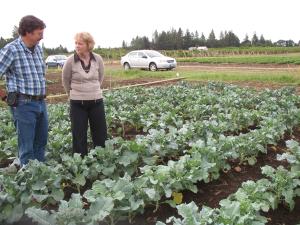eOrganic author:
Micaela Colley, Organic Seed Alliance
This is an Organic Seed Resource Guide article.
The crop improvement needs of organic production systems present a unique set of challenges to plant breeders. Organic farming is not defined by a list of forbidden pesticides, but by fundamental differences in agricultural system functions such as form and availability of soil nutrients, most economically significant pests, and type and duration of exposure to biotic and environmental stresses. In addition, organic consumers in some cases have different varietal preferences than consumers of conventional products. It is logical, therefore, to expect that a variety that performs well when grown under organic management and marketed to organic consumers may have a different set of traits than a variety that performs well under conventional management and is marketed conventionally.
Organic plant breeders Dr. Jim Myers and Dr. Edith Lammerts van Beuren. Photo credit: Micaela Colley, Organic Seed Alliance
Seed companies, university-based plant breeders, private breeders and farmers are beginning to develop varieties in and for organic systems. Traits associated with superior performance in organic systems include:
- insect pest and disease resistance
- weed tolerance
- adaptation to soil- and biologically-mediated nutrient availability
- tolerance to climatic and environmental stresses such as cold soils (a challenge that conventional agriculture manages with chemical seed treatments).
Organic farms commonly have greater within- and between-farm variability, increasing the need for resilience and yield stability in organic varieties. While it may be argued that these traits would also be advantageous in conventional farming systems, a growing body of research is demonstrating significant differences in variety performance in organic and conventional systems, reinforcing the need for system-specific genetics (Dawson et al., 2008; Murphy et al., 2007). Breeding for organics is a relatively new concept in plant breeding circles, but methods and models are emerging as the research evolves (Wyss et al, 2001).
References and Citations
- Dawson, J.C., K.M. Murphy, and S.S. Jones. 2008. Decentralized selection and participatory approaches in plant breeding for low input systems. 2008. Euphytica 160:143-154.
- Murphy, K.M., K.G. Campbell, S.R. Lyon, and S.S. Jones. 2007. Evidence of varietal adaptation to organic farming systems. Field Crops Research 102:172-177.
- Wyss, E., E. Lammerts van Bueren, M. Hulscher, M. Haring. 2001. Plant breeding techniques: an evaluation for organic plant breeding. Fibl: Research Institute of Organic Agriculture. Available online at https://www.fibl.org/fileadmin/documents/shop/1202-plant-breeding.pdf (verified 4 March 2024).
Further Reading
- Breeding Research and Education Needs Assessment for Organic Vegetable Growers in the Northeast. 2016. R. Hultengren, M. Glos and M. Mazourek. Cornell University. Available online at: https://ecommons.cornell.edu/items/59b7b90c-83d2-4b63-824c-0077a95d9955 (verified 4 March 2024).
- The next great challenge: breeding seed for organic systems. M.R. Colley and M.J. Dillon. 2004. Organic Farming Research Foundation Information Bulletin, Winter 2004, Number 13. Organic Farming Research Foundation. Santa Cruz, CA.
- Sustainable organic plant breeding. E.T. Lammerts van Bueren, M. Hulscher, M. Haring, J. Jongerden. 1999. Louis Bolk Institute. Driebergen, The Netherlands. (Available online at: https://orgprints.org/id/eprint/1419/1/g24.pdf) (verified 4 March 2024).
- Seed production and variety development for organic systems. K. Adam. 2005. National Sustainable Agriculture Information Service, ATTRA. Fayetteville, AR. (Available online at: https://webarchive.library.unt.edu/eot2008/20090116010031/http://www.att...) (verified 4 March 2024).
- Organic breeding survey, 2004. Northeast Organic Farming Association of New York. Cobbleskill, NY.
- Organic breeding roundtables summary [Online]. Public Seed Initiative. Cornell University.
- North Carolina organic grain production guide. M. Hamilton. 2005. North Carolina Organic Grain Project. North Carolina State University. Raleigh, NC. (Available online at: https://www.rafiusa.org/blog/organic-grain-guide2013/) (verified 2 Apr 2010).
Journal Articles
Some journal articles can be downloaded at no charge from the web. Others are only available through a university library. Try accessing articles by searching Google Scholar. If you cannot access any of these articles, request a copy from the corresponding author (obtain that information from the abstract, which can typically be found on the web).
- Broadening the genetic base of onion to develop better adapted varieties for organic farming systems. 2005. E.T. Lammerts van Bueren, L.J.M. van Soest, E.C. de Groot, I.W. Boukema, and A.M. Osman. Euphytica 146:125-132.
- Concepts of intrinsic value and integrity of plants in organic plant breeding and propagation. 2003. E.T. Lammerts van Bueren, P.C. Struik, and E. Jacobsen. Crop Science 43:1922-1929.
- Ecological concepts in organic farming and their consequences for an organic crop ideotype. 2002. E.T. Lammerts van Bueren, P.C. Struik, and E. Jacobsen. Netherlands Journal of Agricultural Science 50:1-26.




